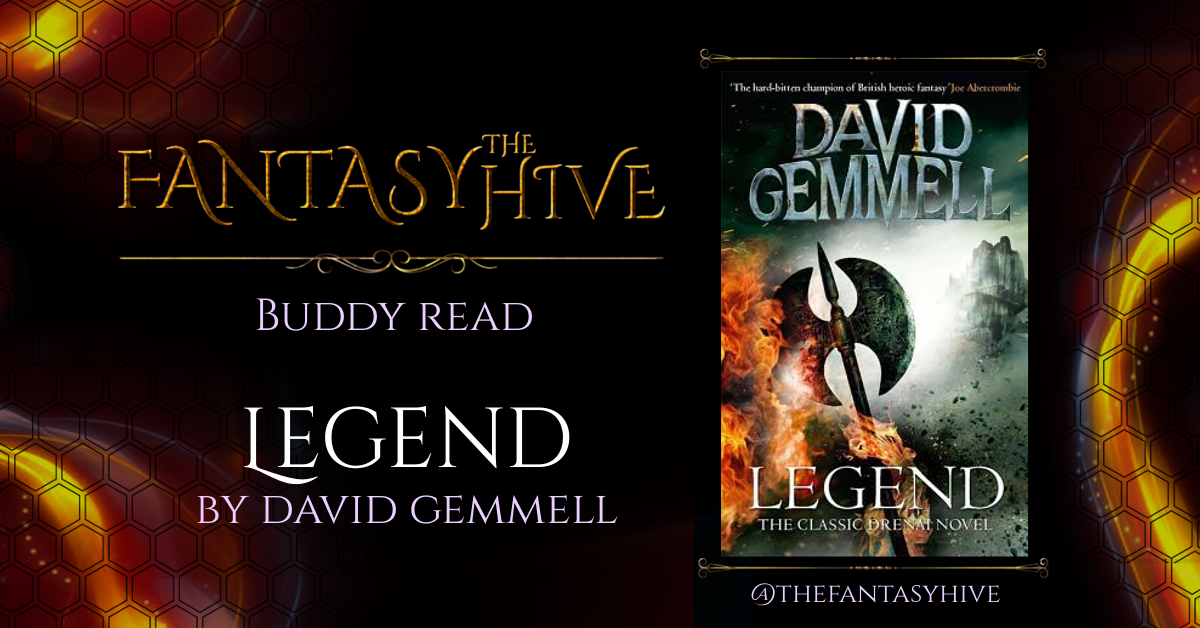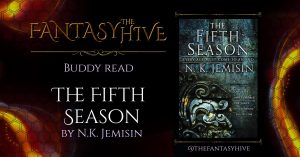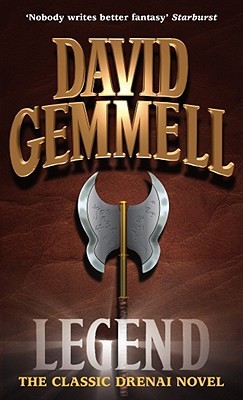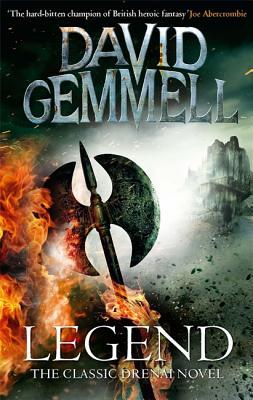The Hive Reads… Legend by David Gemmell
Welcome to the seventh instalment of our ‘Hive Reads’ feature! (You can read the others here.) After settling on Legend by David Gemmell as our next read, a bunch of us here at the Hive diligently noted down our thoughts whilst reading throughout the month. You can read the end result below! Though do beware: spoilers abound.
This month’s read is brought to you by the fabulous team of T.O. Munro, G.D. Penman, James Latimer, J.P. Ashman and Laura M. Hughes.

Laura M. Hughes: Welcome, everyone, to the latest Hive Read! This time we’re getting stuck into Legend by David Gemmell. As always, let’s begin with first impressions. What are everyone’s thoughts on the cover?
G.D. Penman: Mine is an axe on a plain brown cover so… uh. Not giving me much to work with frankly.
James Latimer: That cover will always be special to me, and I imagine a large number of others of a certain age, because that was the classic cover for a long time. I’ve got it somewhere. I think the cover says something about the book – it’s not fancy or pretentious, it’s just a straightforward tale in straightforward packaging – with a big axe!
Laura: ‘Straightforward’ is definitely the word! I have the most recent Orbit edition, which also features an axe, but is a little more dynamic-looking than your brown version. Like James says: it pretty much sums up the story, which is what you want a cover to do, I suppose.
Laura: Any other thoughts before we get into the story?
T.O. Munro: The foreword is a legend in itself. The birth of a book, the making of an author and the poignant unfinished end to a career. Methinks I may not be so much reading this as the Legend by Gemmell, as the Legend of Gemmell. Quite appropriate really, as the Hive read for the month in which the Gemmells are awarded (now was that a deliberate piece of timing, Laura?)
Laura: It was very much deliberate! And yes, I attended the Gemmells again this year in July (along with T.O. and James and a few other Hive members), and the story from the foreword was mentioned there in the opening remarks. A powerful tale indeed.
G.D.: Sadly, my tatty charity shop copy of this book didn’t have a foreword, so I will have to take everyone’s word on it.
Laura: Unlike our other reads so far this year – which have all been published within the last five years – Legend is a ‘classic’ of the genre. More than that, though, it’s very much a product of the 80s. I encountered issues with the book almost immediately, which I’ll go into later, but first I want to ask: did anyone else experience these issues?
T.O.: Like the heroic sixty-year-old Druss with his arthritic knee, this book is a champion that has endured beyond its time. Which is not to say it’s bad; just that there are some moments of disconnect where I went ‘ooh’, and others where the dialogue or plotting went a bit clunky for my taste.
Which prompts me to reflect on cultural and societal shift. A while back I watched a documentary – “It was all right in the 70s” – which displayed all the prejudices and imperfections which were considered normal then. More recently I watched Jonathan Pie rant about Laura Ingalls-Wilder’s Little House on the Prairie books being withdrawn from one library because of their depiction of native Americans (in a book written in the 1880s?).
Like the heroic sixty-year-old Druss with his arthritic knee, this book is a champion that has endured beyond its time. Which is not to say it’s bad; just that there are some moments of disconnect where I went ‘ooh’, and others where the dialogue or plotting went a bit clunky for my taste.
– T.O. Munro
My point, as was Jonathan Pie’s, is that we cannot condemn – or censor – past literature for not adhering to modern standards of inclusion and diversity. We can only hope people are sufficiently widely educated to know that society shifts – indeed advances – in its diversity and inclusivity and that we can read the past without being harmed by it or endorsing its values.
All this is by way of saying that when I read a description of the Nadir as slant-eyed or the hero presuming to kiss an unconscious woman he’s only just met on the lips – without this being presented as in any way off – I note it and move on in a way that I simply wouldn’t if I were reading a more contemporary work.
G.D.: I completely agree with T.O. on this one: banishing any “problematic” books just leaves us with only contemporary fiction and no understanding of the genre’s history. Legend is a classic of the genre, and in it you can see the seeds of what would come later; military fantasy, low fantasy and even grimdark have their roots in this book, but it also has its feet firmly rooted in the heroic stories that came before it. The titular Legend, Druss, could have brushed shoulders with Conan or Elric without either batting an eye. This book exists on a continuum of stories at a pivotal point in the genre’s history… and I am a little bit ashamed that I have never read it before.
Legend is a classic of the genre, and in it you can see the seeds of what would come later; military fantasy, low fantasy and even grimdark have their roots in this book, but it also has its feet firmly rooted in the heroic stories that came before it. The titular Legend, Druss, could have brushed shoulders with Conan or Elric without either batting an eye.
– G.D. Penman
James: While banishing any problematic books isn’t the right approach, leaving them unchallenged isn’t either. I don’t think we should bring Jonathan Pie or Laura Ingalls Wilder into this, as Pie is a comic character who rants about things he doesn’t understand, and the Ingalls Wilder issue was about how having an award named after her continues to enforce a one-sided view of what largely amounts to a genocide. So, while we can still read books from the past (and Little House was actually published in 1932), we shouldn’t be reinforcing worldviews that we no longer support. (I’m not saying the Gemmell Award does this, btw.) Sorry to get all serious – Legend is great.
Laura: There are some really good points being made here. While I myself took issue with a great many things perpetuated throughout the book – namely the presentation of women – there’s no doubting that Gemmell’s work has influenced the genre in a great many positive ways.
Let’s talk about specifics. What did everyone think of Gemmell’s characters? Are they sympathetic and/or engaging?
G.D.: Once again we come back to the age of this book. For the 70s and early 80s, these characters were all average. Now they seem a little bit lacking in depth for the most part. It was nice to see the “useless commander” stereotype flipped, though.
Laura: I really enjoyed that, too! It would have been so much easier to just keep him as a hated figure, but his arc displays one of Gemmell’s strengths – namely, his ability to portray characters on both sides of the conflict as nothing more – or less – than human.
G.D.: It was nice to have the quintessential warrior-poet inheriting Lordship stuff going on too. The magic-strategy-priest-knights didn’t add much to the plot at all except for allowing nebulous ideas like fate to have a spokesperson.
Laura: Yeah, I found the Thirty to be somewhat… superfluous. (Though their omniscience was at times a very handy narrative device for ratcheting up tension.)
G.D.: Druss himself is the only character with any real depth to him, and his story, of outliving everything and everyone that he loved but refusing to give in… I am willing to admit that it got to me. The man trying to live up to the legend, never daring to show a moment of weakness, showed us a glimpse of the end of the lifecycle we’ve seen played out in a dozen other heroic fantasies.
J.P. Ashman: One character in particular struck me as being historical, in which I mean he reminded me of a historical figure I’ve read about in both textbooks and hisfic novels (An-Nasir Salah ad-Din Yusuf ibn Ayyub, anyone? No? I’ll get my coat[-of-plates]). I am, of course, talking about the wonderful Nadir commander Ulric. The scene where he meets Druss, ladies and gentleblokes, was one of my favourite scenes, believe it or not. The scene where the ‘gang’ enter a certain camp to toast a certain fallen comrade, was brilliant, for me. Elements of peace within the war. I entirely agree with G.D. regarding the “useless commander” too. I was immensely pleased with how that played out. I started out disliking him and ended up rooting for him, much like those he commanded.
All in all, I believe I felt for those characters Gemmell would have wanted me to feel for. I cringed when they were in danger, I lamented their loss (those that fell) and I thoroughly enjoyed their dialogue, which was rich, warm and real. That’s not to say there weren’t the odd characters and scenes where I zoned out a bit – the traitors and the ‘templars’, mainly – but the ‘common’ folk, the general troops and our heroes (and Saladin, erm, I mean Ulric) won me over for sure.
I believe I felt for those characters Gemmell would have wanted me to feel for. I cringed when they were in danger, I lamented their loss (those that fell) and I thoroughly enjoyed their dialogue, which was rich, warm and real.
– J.P. Ashman
Laura: The characters are the focus of the story, but the plot itself is centered around one key event: the siege of Dros Delnoch. I personally found the pacing of the story a little odd, and found my interest flagging at crucial times because of this. Did anyone else find issues with the unconventional structure?
G.D.: The first half of this book is a slow buildup to the pivotal event, the siege. For all the talk of epic scale, this book covers exactly one battle. It definitely benefits from that focus and the prep-time gives us a good sense of the lay of the land, but it means that anything outside of that scope gets hurried through. The post-battle “where are they now” was particularly rushed, and it should have been the satisfying ending to the arc where the sacrifices made were given their value. With the addition of the deus ex machina resurrection, the whole finale felt… cheap. Which is horrible because the rest of the book was hitting the emotional beats perfectly.
T.O.: Dros Delnoch conjures up images of every desperate siege of fact and fiction. The Alamo, Verdun, Helm’s Deep – both the one depicted in The Two Towers and the backstory one by which Helm’s Deep got its name. (Dros Delnoch might almost be called Druss’s Deep). Minas Tirith – with its concentric ring of walls. Troy – with Druss playing Hector and Achilles, and Serbitar playing Odysseus but on the Trojan side. There is even an Arthurian ‘sword in the stone’ moment and Dunharrow ‘paths of the dead’ bit.
This is a book that sets out to be epic from the off, much as Stephen King in The Gunslinger started with a similar desire for an epic sweeping story to rival The Lord of the Rings. The story, like its protagonist – Druss – is showing its age and creaks a bit in places, but it still whips along at an entertaining pace and packs a decent punch.
This is a book that sets out to be epic from the off. Dros Delnoch conjures up images of every desperate siege of fact and fiction… The story, like its protagonist – Druss – is showing its age and creaks a bit in places, but it still whips along at an entertaining pace and packs a decent punch.
– T.O. Munro
Laura: I personally found that while the build-up is pretty excellent, the second half of the book on the whole feels rushed, and as such the siege itself seems to fizzle out rather than build to a grand conclusion. (Perhaps that was the point? We’ll never know.) I also felt that the Thirty were an unnecessary addition to the plot, as I mentioned above.
G.D.: The plot is functional when it is a military/low fantasy. When the supernatural “high fantasy” elements are brought in, it starts to fall apart in a cloud of vagueness. This has been my experience with all of Gemmell’s writing. I was thoroughly put off by his writing in his later books, I could never understand the appeal of his work, but now that I have read Legend, I get it. The details of the military action worked wonderfully, the importance of “heroes” in that setting – every part of the story that was about the battle worked. Everything outside of that felt superfluous.
James: Back when I first read it, I liked some of the “vagueness” as you put it, because it hinted at myths and legends and fantastic forces at work, without spelling them all out. A bit like the Black Company books (which, in a way, were the US equivalent of Gemmell, fantasy for folks who wanted something different in the 1980s). I don’t know what I’d say now, but I hope I’d still appreciate that Gemmell managed to tell a fairly predictable tale about a hero and a siege that you knew he was going to “win”, but make it tragic, unpredictable, gripping, and ultimately something that would stick with you for the rest of your life.
Gemmell managed to tell a fairly predictable tale about a hero and a siege that you knew he was going to “win”, but make it tragic, unpredictable, gripping, and ultimately something that would stick with you for the rest of your life.
– James Latimer
J.P.: This was less about the tactics, the war, and more about the people. How folk can be inspired and morale raised by the one or the few, or visa versa in fact. It was about great characters coming together with ‘lesser’ characters to raise them up against insurmountable odds. The ‘winning’ of the war was always in question for the characters, less so for us, but the fighting of the war was what was intriguing and it was how they were going to fight as a united front that dragged us along, I think. Will Druss band them together as one and if so, how? Will that be enough? Not his – or others – tactics, but their offered words, camaraderie – friendship! – and inspiration to fight as one. To fight until the end, if needs be. It was the coming together of different walks of life, different characters that raised a rather simple plot up from those alike to become… a legend.
Laura: That’s a really good point, J.P., and on the whole I think he did what he set out to do in that regard.
Finally, let’s talk about worldbuilding, which is traditionally a HUGE part of the fantasy genre. How well do you think Gemmell managed to create an original, alternative world readers can immerse themselves in? I know a few of us found it a little problematic…
G.D.: There is obviously a racial aspect to the worldbuilding that might sit uncomfortably with the modern reader, but to me the big problem wasn’t that the “foreigners” had cultures inspired by others, it was that the Drenai culture was “generic western fantasy” by comparison. You didn’t get a lot of the other cultures anyway, but the tantalising hints that we got were enough for a reader to fill in the blanks whereas the Drenai were just… there.
James: The worldbuilding expands a bit in subsequent books, and what Gemmell does really well is a sense of the ebb and flow of history, and the idea that nations and empires don’t last forever. This is a crucial battle, but it won’t be the last, and the Nadir may (do?) eventually conquer the Drenai – just as, I believe, the Drenai once conquered the lands they now hold. The Drenai are never painted in a particularly positive light, either – it’s not the Light against the Dark at Minas Tirith, it’s just Us and Them. And yes, Them are given some unflattering racist stereotypes, but their leader is still honourable in the end – honour being a big thing for Gemmell’s old fashioned sensibilities (not a bad thing).
Laura: Brilliant points all around. Before we wrap things up, does anyone have any recommendations for books similar to Legend?
James: ‘Gemmell’s other books’ is the obvious answer. I struggle to think of other authors quite like Gemmell, though there must be some. Gemmell was like a bridge between classic Sword and Sorcery and more morally complex modern tales, so maybe some of those? I probably haven’t read many of the books I suspect are quite similar, either…I think if you want to read a Gemmell-type book you just read the man himself.
Laura: Awesome. Thanks, James. And thanks for sharing so many excellent insights into Legend, everyone!
That’s it for this month! Thanks again to our wonderful reading team of T.O. Munro, G.D. Penman, James Latimer, J.P. Ashman and Laura M. Hughes.
Join us again soon for our group read of THE FIFTH SEASON by N.K. Jemisin!



